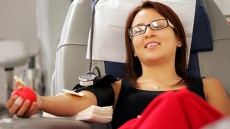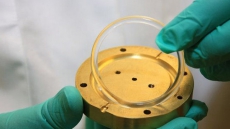Scientists are one step closer to developing the world's first vaccine for heart disease that will reduce immune-based inflammation in arteries, leading to decreased plaque buildup.
The fundamental discovery has shown positive signs for the development of an autoantigen-specific vaccine for reducing the amount of atherosclerotic plaques in mice.
Atherosclerosis is a chronic inflammatory disease of the arterial walls which thicken due to accumulation of cholesterol and triglycerides.
"The T-cell peptide-based vaccine could aid in preventing heart disease and stop or reduce disease progression. The vaccine could also target strokes which are a product of plaque buildup in arteries," said Harley Tse, a professor of immunology and microbiology in Wayne State University's school of medicine.
The discovery was made in the laboratory of Klaus Ley, a prominent vascular biologist of La Jolla Institute for Allergy and Immunology (LIAI).
Shaw and Tse demonstrated that two T cell epitopes of the autoantigen "apoB100" are deeply involved in the development of the disease.
Although T-cells of the immune system are known to participate in the development of heart disease, by what and how these T-cells are directed to act has not been elucidated.
"With the discovery of the disease-causing T-cell epitopes, we can now manipulate the activities of the T-cells responding to these epitopes to control the disease," Shaw said.
Shaw and Tse conceptualised that finding the "apoB100" epitopes capable of stimulating the disease causing (atherogenic) T-cells is a prerequisite to understand how these T-cells are involved in heart disease development and how to control their adverse effects.
They identified two short sequences of "apoB100" that were able to direct specific T-cells to proliferate as well as to cause worsening atherosclerosis.
"This discovery is significant because it identifies the target T-cells and makes it possible to manipulate this population of pathologic T-cells away from their harmful activities," Shaw and Tse said.
The novel discovery is reported in the Journal of Immunology and Clinical Research.





